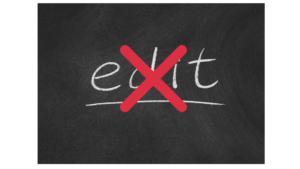Table of Contents
Objecting to Exemptions: Amendments and the 4003 Deadline
When does the 30-day deadline of Rule 4003 get restarted?
Does any amendment of schedules extend the 30-day objection deadline of Rule 4003, or only amended exemptions or assets? Another bankruptcy attorney recently saw that a creditor objected to his client’s exemptions, which creditors are allowed to do. The issue is, there’s a deadline to object to exemptions, as a rule. Creditor objected after the deadline, and debtor’s counsel asked if he was justified to seek Rule 11 sanctions.
There are exceptions that can extend or restart that objection deadline. Obviously, it would be fair that, for example, amending the exemptions on Schedule C gives an opportunity to object to the amendments and new exemptions. But what if there’s an amendment to any of the schedules? Does amending income on Schedule I give a new opportunity to object to exemptions? Let’s take a look.
Examining The Law: FRBP 4003
Federal Rule of Bankruptcy Procedure 4003
As always, we start with the law, which in this case is Federal Rules of Bankruptcy Procedure (FRBP) Rule 4003(b)(1):
Except as provided in paragraphs (2) and (3), a party in interest may file an objection to the list of property claimed as exempt within 30 days after the meeting of creditors held under §341(a) is concluded or within 30 days after any amendment to the list or supplemental schedules is filed, whichever is later. The court may, for cause, extend the time for filing objections if, before the time to object expires, a party in interest files a request for an extension.
Seems straightforward enough. Let’s break it down.
30 days after the 341a
The part which everyone can agree is the part where it says the deadline to file an objection to exemptions is within 30 days after the 341a meeting of creditors. The Supreme Court has ruled on this very specific bankruptcy rule, and has a no-nonsense strict interpretation of it: the law is the law. “By negative implication, the Rule indicates that creditors may not object after 30 days ‘unless, within such period, further time is granted by the court.'” Taylor v. Freeland & Kronz, 503 US 638, 643 (Sup Ct 1992).
“Deadlines may lead to unwelcome results, but they prompt parties to act and they produce finality.” Id. at 644. The Supreme Court is prioritizing finality in bankruptcy, even though the result may be unfair or ugly.
But what about the second part?
Or within 30 days after any amendment
The result is maybe not as clear as it might appear at first blush. The rule again: “…a party in interest may file an objection to the list of property claimed as exempt …or within 30 days after any amendment to the list or supplemental schedules is filed, whichever is later.” Rule 4003b1.
Debtors have the right to file amendments, per FRBP 1009. The plain language allows a restarting of the clock of an amendment to the list. But what is “the list?” Looking back a bit, the start of 4003 says, “A debtor shall list the property claimed as exempt under §522 of the Code on the schedule of assets.” So for the debtor seeking a friendly interpretation, there it is: the deadline to object only restarts if amending the list… of assets or exemptions. But wait..

How Courts Interpret Rule 4003
Amending the exemptions? Or any amendment?
Note that at least one Bankruptcy Appellate Panel (BAP) has indicated that the opportunity to object restarts upon the amending of any schedule: “The trustee or any creditor may file objections to a debtor’s claimed exemptions within 30 days after the conclusion of the section 341 creditors’ meeting, or within 30 days after the filing of any amended schedules. Fed. R. Bankr.P. 4003(b).” In re Alexander, 239 BR 911, 914 (8th Cir BAP, 1999), affirmed by an Eighth Circuit sitting en banc at 236 F3d 431 (8th Cir 2001)(per curiam), overturning In re Lindberg, 735 F2d 1087 (8th Cir 1984).
The “any amended schedules” language of the Alexander BAP would be supported by the Rule 4003 text of “or supplemental schedules.” Maybe a new expense on a changed Schedule J isn’t an amendment “to the list” but it can be argued that it’s a supplemental schedule. Then again, is it really supplementing the assets and exemptions? This is why there are lawyers to litigate things.
New Objection Deadline for Conversion?
The Bankruptcy Code says nothing about a new deadline thirty days after a converted case. However, some courts have found that it’s only fair that a Chapter 7 trustee has the chance to object to exemptions, since trustees in Chapter 11 and 13 cases look at exemptions with a different mindset.
So note, for example, In re Campbell, 313 BR 313 (10th Cir BAP 2004), which allows a new 30 days to challenge exemption upon conversion (from Chapter 13 to 7), despite this rule not being found in the Code, for fairness.
Other circuits and bankruptcy courts around the nation also allow the restarting of the clock upon conversion though it’s not written in the Code, citing due process. This is a split among bankruptcy courts that at least one court has said needs a Supreme Court ruling to unify.
The dissent in a divided Second Circuit Court of Appeals writes: “There is strong textual support for both positions, the closest Supreme Court decision [citing Taylor] does not compel either result and there are policy considerations weighing in favor of both interpretations. The issue is ripe for a clarifying amendment or decision by the Supreme Court.” In re Bell, 225 F. 3d 203, 222 (2nd Cir 2000)
Some Ninth Circuit Case Law and Rule 4003
The 9th Circuit has sided with the strict language of Rule 4003(b) and does not allow a new opportunity to object to exemptions upon conversion. “Reading Rule 1019(2) in conjunction with § 348 compels the conclusion that § 348 generally requires the order for relief to remain unaltered by conversion from Chapter 11 to Chapter 7. ”
The Ninth Circuit continued: “To the extent that Rule 1019(2) resets any deadlines, it does so only for those exceptions expressly enumerated in section §§ 348(b) and (c). Neither § 341 nor § 702(b) (providing for the election of the Chapter 7 trustee “[a]t the meeting of creditors held under section 341″) is among these enumerated exceptions.” In re Smith, 235 F. 3d 472, 477 (9th Cir, 2000).
This was echoed more recently by the Ninth Circuit BAP. “But, under Rule 1019(2)(B)(i), parties in interest are not afforded a new time period to object to exemptions when cases are converted from chapter 11 to chapter 7 more than a year after plan confirmation.” In re Masingale, 644 BR 530 (9th Cir BAP, 2022).
For more reading and a good discussion of exceptions to 4003 in the 9th Circuit, such as when an asset is amended to be clarified, or an exemption is ambiguous and whether that triggers Taylor or allows an objection in the Ninth Circuit (spoiler: it does), see In re Morgan-Busby, 272 BR 257 (9th Cir BAP, 2002).
Also, a look at each circuit’s rule on whether a converted case restarts the objection deadline reveals a split ready for the Supreme Court.
In Sum
FRBP Rule 4003 and the Supreme Court in Taylor can lead one to believe that any exemption objection a month after the 341a is late. However, if a creditor pounded due process and and the above cases, they may have a leg to stand on, making Rule 11 sanctions unlikely, given there’s a chance they can prevail on the law, citing the 8th Cir BAP and seeking an extension of Campbell et al.
It’s just one opinion; I’m sure reasonable minds can disagree.





